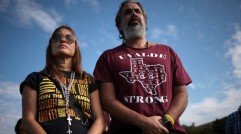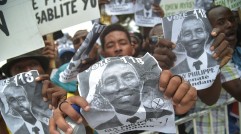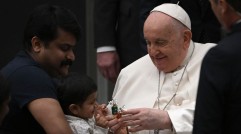Mexico Drug, Gang, and Crime News: Son of Sinaloa Cartel's Boss Captured in Mexico
The son of alleged Sinaloa drug cartel boss, Ismael "El Mayo" Zambada, was captured on Thursday, a Mexican official announced, according to The Associated Press.
Ismael Zambada Imperial, also known as "El Mayito Gordo," has allegedly assumed a more prominent role in the cartel this year.
Since the capture of capo Joaquin "El Chapo" Guzman in February, Zambada became the top boss and his son, Imperial, rose in ranks. The Sinaloa cartel is one of Mexico's largest drug-trafficking organizations and has a large global reach.
Imperial, the third son of Zambada to be detained in recently, was arrested in Sinaloa state and was taken to Mexico City.
El Occidental reported that he was surprised and captured by the Mexican Navy during an operation in Culiacan, Sinaloa, and his father may have been present but escaped.
20minutos reported that the Mexican military had been planning the operation to capture the son, who is active on social media sites like Twitter and Facebook. The accounts used by Imperial were monitored by the military before the capture.
Previously, Jesus Vicente Zambada Niebla and Serafin Zambada were arrested.
Zambada Niebla was arrested in 2009 and was extradited to the U.S. where he pleaded guilty to drug trafficking in 2013. Serafin Zambada was arrested in 2013 at an Arizona border crossing, where he also pleaded guilty to drug trafficking and faces a minimum 10-year prison sentence.
Despite the success in finding his sons, the big boss remains elusive and U.S. authorities have offered a $5 million reward for information that could lead to his capture.
The wide reach of the cartel has been a concern for U.S. authorities since their presence has grown to include Europe and Australia.
Most recently, the FBI announced that some of the co-conspirators caught, who worked when Guzman was in charge, have been convicted.
In October, Rafael Humberto Celaya Valenzuela, 41, was convicted of conspiracy to distribute drugs. He was involved in an incident where 346 kilograms of cocaine from source countries like Bolivia, Panama, Colombia and Belize, worth more than 750 pounds worth millions of dollars, were to be delivered to a port in Algeciras, Spain, in 2012.
Following the delivery of the conviction, U.S. Attorney John P. Kacavas said, according to a statement by the FBI, "Whether along our southwest border, in major American cities, or in bucolic New Hampshire, we will use every law enforcement and prosecutorial tool at our disposal to bring international drug traffickers to justice."
Subscribe to Latin Post!
Sign up for our free newsletter for the Latest coverage!
* This is a contributed article and this content does not necessarily represent the views of latinpost.com














